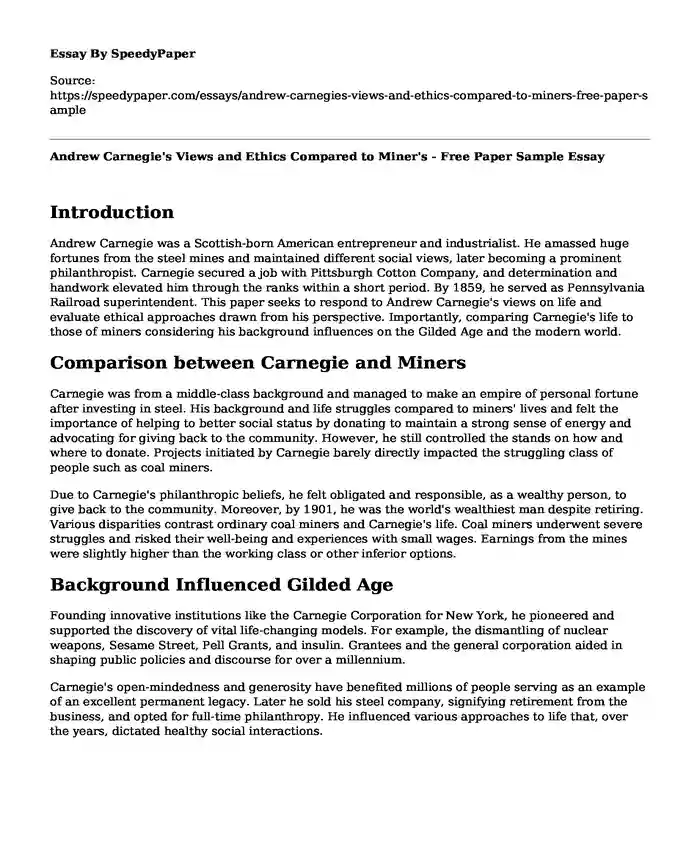Introduction
Andrew Carnegie was a Scottish-born American entrepreneur and industrialist. He amassed huge fortunes from the steel mines and maintained different social views, later becoming a prominent philanthropist. Carnegie secured a job with Pittsburgh Cotton Company, and determination and handwork elevated him through the ranks within a short period. By 1859, he served as Pennsylvania Railroad superintendent. This paper seeks to respond to Andrew Carnegie's views on life and evaluate ethical approaches drawn from his perspective. Importantly, comparing Carnegie's life to those of miners considering his background influences on the Gilded Age and the modern world.
Comparison between Carnegie and Miners
Carnegie was from a middle-class background and managed to make an empire of personal fortune after investing in steel. His background and life struggles compared to miners' lives and felt the importance of helping to better social status by donating to maintain a strong sense of energy and advocating for giving back to the community. However, he still controlled the stands on how and where to donate. Projects initiated by Carnegie barely directly impacted the struggling class of people such as coal miners.
Due to Carnegie's philanthropic beliefs, he felt obligated and responsible, as a wealthy person, to give back to the community. Moreover, by 1901, he was the world's wealthiest man despite retiring. Various disparities contrast ordinary coal miners and Carnegie's life. Coal miners underwent severe struggles and risked their well-being and experiences with small wages. Earnings from the mines were slightly higher than the working class or other inferior options.
Background Influenced Gilded Age
Founding innovative institutions like the Carnegie Corporation for New York, he pioneered and supported the discovery of vital life-changing models. For example, the dismantling of nuclear weapons, Sesame Street, Pell Grants, and insulin. Grantees and the general corporation aided in shaping public policies and discourse for over a millennium.
Carnegie's open-mindedness and generosity have benefited millions of people serving as an example of an excellent permanent legacy. Later he sold his steel company, signifying retirement from the business, and opted for full-time philanthropy. He influenced various approaches to life that, over the years, dictated healthy social interactions.
Views on the Ethics of Carnegie
I feel that Carnegie's philanthropic approaches were not ethical since the wealthy people decided on the whole process. Directives from the rich people on where to donate or invest and the services offered disadvantaged the poor. For example, the donations he provided to libraries and museums in Pittsburgh implied a lot, whereas vulnerable groups like coal miners thrived in the same community.
Although Carnegie, at times, responded to these groups lie ordering minted medals for two families who lost their relatives while saving others, much needs to be addressed. Many people, like the hundred and eighty, who lost their lives, had sacrificed a lot at the expense of the immense wealth Carnegie had acquired. As an ethical person, Carnegie's donation initiatives should have prioritized benefiting such families.
Conclusion
In conclusion, Carnegie had several desirable traits and advocated for innovation and the wealthy class giving back to the community. His general idea of giving perceived that money donated should establish institutions to help people. However, significant differences appear when comparing and contrasting Carnegie's life to coal miners. His survival for the fittest approach was unethical, considering the number of poor and struggling people. Direct empowerment of vulnerable groups like coal miners offered ethical models to complement his generous spirit.
Cite this page
Andrew Carnegie's Views and Ethics Compared to Miner's - Free Paper Sample. (2023, Dec 14). Retrieved from https://speedypaper.com/essays/andrew-carnegies-views-and-ethics-compared-to-miners-free-paper-sample
Request Removal
If you are the original author of this essay and no longer wish to have it published on the SpeedyPaper website, please click below to request its removal:
- Ethics and Ethical Dilemmas in Our Free Essay Sample
- Ethical-Legal Dilemma in Nursing, Free Paper Sample for You
- Paper Example. the American Setting of Citizenship Approach
- Essay Sample on Education Development Strategies
- Paper Example. Differentiate Between Law and Ethics in Healthcare
- Essay Sample on The Challenges Faced by Personnel from Cuba
- Map of Sudbury - Free Essay Example
Popular categories





